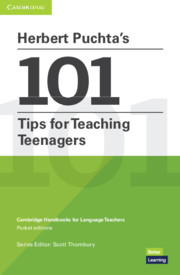 Herbert Puchta's 101 Tips for Teaching Teenagers
Herbert Puchta's 101 Tips for Teaching Teenagers Book contents
H - Behaviour Management
Published online by Cambridge University Press: 28 October 2023
Summary
The non-verbal communications expert Michael Grinder once said, ‘If you can teach teenagers, you can teach anyone!’ That's true of what we see in many teenage classrooms, and every teacher of teens knows how challenging they can be at times. Provocative and disruptive behaviour, aggressive language, inability or unwillingness to pay attention, lack of persistence when it comes to homework, problems with phones during class – the list goes on. In this section, we look at all these and other issues, and suggest practical things we can do to help and deal with the difficulties, being understanding and supportive, yet firm and fair.
83 Help learners find out how to pay attention best
84 Problems with homework? Don't give up!
85 Use specific language strategies to stop disruptive behaviour
86 Don't let conflicts escalate – make your learners think
87 Learners are shouting out the answer? Vary the expected response
88 Avoid conflicts around mobile phones
89 Help learners solve conflicts in constructive ways
90 Have strategies ready to deal with attention-seekers
91 Keep calm with difficult learners
92 When learners are verbally aggressive – go meta
83 Help learners find out how to pay attention best
Learners sitting still with their backs straight may give the impression they’re paying attention, but there is no guarantee that this is actually the case.
In an experiment a few years ago (see reference below), a dull two-anda- half-minute voice message was played to a group of 40 people. Half the group was invited to do a kind of doodling activity while listening, and the other half was told to sit still. Neither group knew there would be a memory test afterwards. When asked about details from the recording, the doodlers remembered 29% more details than those in the other group.
This shows that our beliefs about what paying attention involves may not always be right. It appears that when we’re bored and about to switch off, doodling can in fact keep us alert and attentive.
Share this information with your learners and ask them whether they believe doodling while listening may influence their own retention. Then get them to try it, and see whether what they’d thought was right.
Drinking water, eating a snack and chewing gum could have an equally positive effect, by the way.
- Type
- Chapter
- Information
- Herbert Puchta's 101 Tips for Teaching TeenagersCambridge Handbooks for Language Teachers Pocket editions, pp. 90 - 100Publisher: Cambridge University PressPrint publication year: 2020


